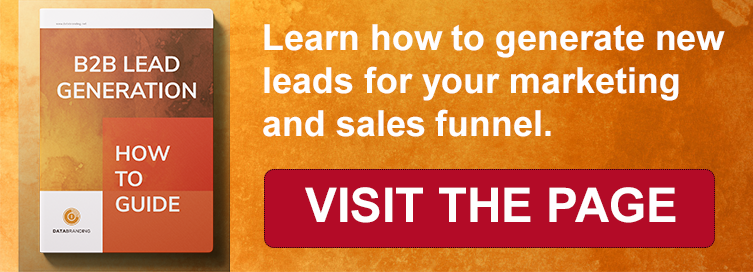
When sales teams are prospecting, the first thing they should do is contact potential customers with an email, aiming to get a answer from them. Yet, if the email wasn't well designed, most of the prospects won't reply to it.
Were they very busy? Did they not read the email? Were they not interested in the offer? The e-mails that we send must be properly designed, making sure that they: get to the point, share our value and be effective.
Successful emails are those that make our prospects become really interested on them. In order to do so, we must understand how we can help them, based on the solutions that our company has to offer. We must also know about our customer's industry and about the customer themselves.
Contacting your leads is part of a whole other things you can do to have a lead generation strategy. Visit our page where we discuss other tactics and tools you can use to generate demanda and more leads for your company.
Here are some recommendations of what you should do.
Get interested in your prospect
One of the first steps to take in the Inbound Sales Methodology, is to do some research on our prospects in order to better understand: who are they, what industry do they work at, and how we can specifically help them. In order to achieve this, we must keep the following 3 aspects in mind:
- Their company's information
- Their industry
- Their social networks
The easiest way to find information about the company of our prospects is by visiting the company's website. At this website, we find the value proposal that they offer to their clients, the kind of product or service that they provide and, if there is a way in which we can contribute to their proposal as well.
Who are their clients? We must also understand the kind of service that they provide and know the size of the company in order to understand its structure and the place at which our contact is at within the company, as well as his specific problem. Having this information helps us know the motivators, fears, objectives and obstacles of the company and of our contact. The main aspects to review are:
- Company size
- Yearly income
- Who they sell to
- What do they sell
- Our contact's role in the company
- If there are any other people who could be involved in the sales process
Reading about the industry allows us to know more about its competitors and thus, use this information as a context/reference point. It also helps us know about its current trend and take it as a reference. The information to review is:
- News on the industry
- New acquisitions or investments
- If they are geographically expanding
- Events that they organize
- Groups to which they belong
And finally, check out the prospect's social networks in order to know more about his tastes, preferences and about the social interaction that he has on social networks. This will help us find the common interests that we might share and empathize with him in order to break the ice during our first communication. As a recommendation, we may want to check out in social networks -such as LinkedIn- the companies at which the prospect has worked at before. This will not only help us know the contact's degree of expertise, but we will also help us get more information about other companies to prospect that happen to belong to that same industry.
Having done this research, we can now write a more personalized email, one based on the information of the contact's context, company and industry.
-A regular sales email usually looks like the following:
Dear X,
My name is Mr X. We are a company dedicated to X and we always offer an excellent service and great quality in what we do. Count on me to present our X services -product- to you.
This email does not provide any interesting information to the receiver. Imagine that the contact that you send this email to is having a bad day; he had a fight with his boss, has little time to deliver a project and his email inbox is full. The first thing that this person will think is "what do I care? I'd better delete this trash".
- Let's now see how a more personalized email, based on the research that we just mentioned looks like:
Dear X,
We have worked with some companies from your industry such as "Company Name", which is why, I usually read news about it. We found an article from your company in which you were interviewed.
We were very interested in your insight and we were struck by the aggressive expansion plan that you have in mind. When this happens, companies usually have to (name the problem they may have and that you have helped other clients solve) as well as to hire and train new staff effectively (you might want to add here something about the value proposal that we mentioned before).
As you can see, this is an interesting opening at which you mention the points that you both have in common, as well as show that you are really interested in him and in the company.
Writing an email's title
Our email's title should be an interesting phrase that makes reference to your subject and that would invite the person to open the email. If the person's attention is not captured by it and the email does not get opened, all of our research efforts will have been in vain. The recommendations are:
- Avoid sales vocabulary such as free, save, buy, etc...
- Try to mention the person's name in the title, this increases the chances of him opening the email
- Keep your title short
- Try not to sound advertising
- Do not mention your company's news, regardless of how eager you are to announce your new and latest great product right ahead
Usually, email titles go: "My company's services...", "Save up to 30% on X...", "Our new and miraculous product is here!" This kind of titles invite prospects to immediately delete them.
What works best is:
- If someone else referred the prospect to you, start with "Mr. X asked me to get in touch with you"
- Mention something that might be important for the company and that you discovered in your research: "Question about your article published in X" or "Recommendation for your expansion plan".
Use a topic that interests him, one within context, and they will give you the time that you need to share what you have to say.
The email's title is thus, a critical and very important aspect to keep in mind when writing an email.
Opening the email
The best way to make a first opening paragraph is by creating a sense of empathy with our prospect and by keeping the information that we offer to him relevant and within context. This can only be achieved by following our N.1 recommendation: Show interest in the prospect.
Avoid writing emails like the following:
Dear X,
I'm not sure if you can help me, but I thought you could give me some advice. Could you contact me with person in charge of your company's Human Resources department so I can offer this person our hiring, outsourcing and training services? I appreciate the attention that you pay to this email.
With an email like this, we are once again, not generating any value for our prospect, he might even ask himself why was this email sent to him at all. A very kind and patient person might reply to it but, most people will immediately delete it, since they won't find anything interesting or of value for them.
Try doing the following instead:
- Find a common interest
- Talk about something that is currently happening on his company or industry
- Get credibility by mentioning that you've worked with other companies of his industry
- Show that you are interested in him
- Talk about his problem (not your offer per se)
Here is once again our example email, based on our recommendations:
Dear X,
We work with many companies from your industry such as "Name of the company" (create trust and imply that you already know his industry well) so we've read the recent news on it. We found an article from your company in which they interviewed you (article you both have "in common", the prospect will want to know your opinion about his interview) and are very interested in your insight. We are surprised by the aggressive expansion plan that you have in mind (information in context and relevant both for him and his company). When this happens, companies usually have to hire and train new staff effectively (show that you know about the problem that he will have to face).
Value Proposal
A value proposal states how the person will benefit from using your product or service. Try not to mention the product's characteristics, talk about its tangible benefits instead. Keep in mind that the prospect is only interested in his personal objectives and in solving the problems that he has to face.
Try talking about:
- The company's objectives
- Metrics that show your results with other clients
- Valuable information, mention ways in which they can know more about you and about what you've done for other clients.
Like this:
Dear X,
We work with many companies from your industry such as "Name of the company" which is why we are well informed about it. We found an article from your company in which they interviewed you and are very interested on the aggressive expansion plan that you have in mind. When this happens, companies usually have to hire and train new staff effectively.
HERE COMES THE VALUE PROPOSAL:
For this reason, you may be interested on how we have helped other companies of your industry to act faster without having to face so many obstacles. (Name statistics). Our clients have reduced their training curve from 3 to 1 week and reduced their staff turnover by X%. I here share an article with you on how we have helped (name your client and add a link to the document) to achieve this.
Final Step
The objective of our email is to get in touch with our prospect and to have him give us some of his time, either in person or by the phone. Which is why, you must close the email interaction like this:
If you'd like us to give you a quick phone call, I have some ideas that you might be interested in/ might come in handy for you.
This is how our email should finally look like:
Dear X,
We work with many companies from your industry such as "Name of the company" which is why we are well informed about it. We found an article from your company in which they interviewed you and are very interested on the aggressive expansion plan that you have in mind. When this happens, companies usually have to hire and train new staff effectively.
For this reason, you may be interested on how we have helped other companies of your industry to act faster without having to face so many obstacles. Our clients have reduced their training curve from 3 to 1 week and reduced their staff turnover by X%. I here share an article with you on how we have helped X to achieve this.
If you'd like us to give you a quick phone call, I have some ideas that you might be interested in/ might come in handy for you. How about Friday at 10:00 am?
As you can see, writing a good email is key to getting the doors open for sales. It is a skill that anyone (both from marketing and sales department as well) must develop in order to communicate more effectively with potential clients.
Learn how to get more targeted leads for your business:
Would you like to know how to train your marketing and sales teams so they can learn how to become top-sellers in this new digital age? Contact us!

